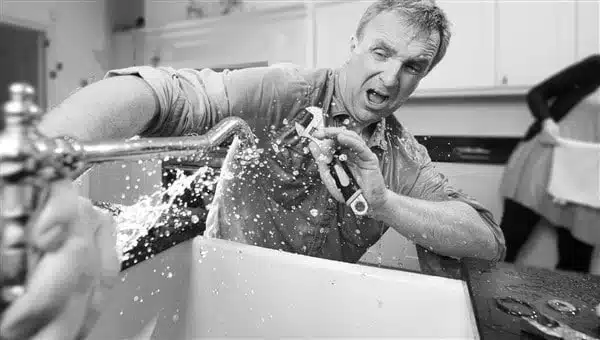Congratulations on your new home! As a new homeowner, you might be eager to tackle any home repair or installation projects head-on. DIY (Do-It-Yourself) projects can certainly be rewarding and cost-effective, but when it comes to plumbing, a slight mistake can turn into a costly disaster. Here, we’ll explore six common DIY plumbing mistakes and how you can avoid them.
Table of Contents
DIY Plumbing Mistakes: Not Properly Preparing
Diving headfirst into a plumbing project brimming with enthusiasm is something we’ve all been guilty of at one point or another. Nonetheless, failing to adequately prepare before the commencement of your project might leave you swimming in unforeseen troubles. Before you start to wrench away, take a moment to fully comprehend the task at hand.
Perhaps you’re trying to fix a leak or looking to install a new fixture. Either way, make sure you’ve done enough research to understand the scope of the project and its potential pitfalls. Take time to learn about the tools you’ll need and ensure they’re on hand before you start.
Imagine you’re a General going to war; you wouldn’t go into battle without a strategic plan, would you? Well, plumbing projects are no different. A water leak can quickly escalate into a full-blown flood, so it’s essential to have a contingency plan ready for such scenarios.
Remember, patience and preparation are key when tackling DIY projects. Think of it as putting together a puzzle; every piece has its place and purpose. Rushing the process without a proper plan could leave you puzzled, or worse, with a plumbing disaster. Don’t allow your eagerness to outpace your preparation – take the time to plan, and you’ll be on track for a successful project.
Over Tightening Connections Can Cause Breakages
Tightening connections until they squeak might sound like the way to ensure a water-tight seal, but in the world of plumbing, there’s such a thing as ‘too tight’. Many enthusiastic DIY-ers hold a belief that if some tightening is good, then more must be better. Sadly, this myth often results in DIY plumbing mistakes such as broken fittings, cracked pipes, and leaks that only appear down the road.
You see, the reality is that plumbing connections aren’t built to withstand Herculean strength. Over tightening them can lead to fracture lines that might not be visible immediately but can cause leakage in the future.
So how tight is right? Typically, a ‘hand-tight’ fit is all you need. It’s enough to create a seal without stressing the materials. So, the next time you’re armed with a wrench and an earnest desire to prevent leaks, remember – the plumbing world abides by the Goldilocks principle: not too loose, not too tight, but just right!
Using Drain Cleaners as a Go-to Solution for Clogs
It’s a common scene in many homes: a slow-draining sink or a stubbornly clogged toilet. In moments of exasperation, reaching for that bottle of chemical drain cleaner seems like the easiest solution. But beware, my friend, because this shortcut could be a highway to bigger plumbing woes down the line.
You see, the magic potion that makes clogs disappear is actually a cocktail of harsh chemicals. While they might be effective at clearing blockages, they’re equally talented at eroding your pipes over time. Repeated use can result in damage that’s not just costly but also potentially harmful to your home.
Instead of opting for this seemingly quick fix, why not try an old school method first? A plunger or a plumber’s snake could be just the tool you need to rid your pipes of unwanted blockages. They’re less damaging and arguably more satisfying to use – there’s nothing like the victory of manually unclogging a stubborn drain!
If you’re facing a persistent clog that refuses to yield to your plunging prowess, it might be time to put down the tools and pick up the phone. Persistent clogs can sometimes be indicative of more serious underlying issues that are best left to the plumbing pros. In such scenarios, calling in a pro is not admitting defeat; rather, it’s a strategic move to ensure your plumbing system continues to function optimally.
So, the next time you’re faced with a drain that’s more stubborn than a mule, remember this: chemical drain cleaners aren’t the only solution, and more often than not, they’re not the best one. Choose your weapons wisely and know when it’s time to call for backup.
Related Content Tutorials
Forgetting to Turn Off the Water Supply Before Working
Picture this: you’re deep into your DIY plumbing project, your tools are out, your focus is sharp, and then suddenly, water! Everywhere! This scene, straight from a slapstick comedy, is a real-life nightmare for many enthusiastic but forgetful DIY-ers. It’s easy to get so wrapped up in a project that you overlook one crucial step – turning off the water supply.
Let’s take a moment to acknowledge our watery foe. Water, while essential for life and great for a refreshing dip on a hot day, can be a significant adversary when released unchecked into your home. It’s a relentless force that won’t shy away from flooding your living room or turning your basement into an impromptu swimming pool. Such scenarios are not just messy but can also cause severe damage to your furniture, flooring, and electrical systems.
So, before you dive into your project, make sure you’ve switched off the water supply. Whether you’re working on a faucet, toilet, or the kitchen sink, each has a shut-off valve. Familiarize yourself with the location of these valves and ensure they’re turned off before you start tinkering away.
Also, remember, turning off the water doesn’t mean you’re in the clear just yet. There’s always residual water in the pipes, which can lead to a mini-waterworks display when you least expect it. Be ready with a bucket or a towel to catch the remaining water once you start your work.
Consider this a friendly reminder to respect the power of water and to keep your home dry and disaster-free. Make shutting off the water supply a non-negotiable first step in avoiding DIY plumbing mistakes.
Not Applying for Required Permits for Major Plumbing Work
Picture this – you’ve just completed a major plumbing project in your new home, you’re basking in the glory of a job well done, only to find out that your DIY victory might not be as sweet as you’d thought. What could possibly go wrong after such a triumph? One word – permits. Yes, as surprising as it might sound, there are certain plumbing tasks that require permits to be executed.
This is not some unnecessary bureaucracy designed to rain on your DIY parade. Instead, it’s a safety net to ensure the work is up to par with all the building codes and regulations. Failing to get the necessary permits could result in fines, and worse, it could create problems when you decide to sell your home later. Not to mention, it could be downright dangerous if the work done isn’t up to standard.
Here’s the takeaway – always check with your local city or county offices before you plunge into a big DIY project. They’ll be able to tell you if a permit is needed for the task at hand. By doing so, you’ll not only save yourself from potential penalties but also ensure that your plumbing work is safe and up to code. After all, the ultimate goal of any DIY project is to enhance your home, not create potential hazards with DIY plumbing mistakes.
So, while navigating the permit process might seem like a hassle at the outset, it could save you a world of trouble down the line. Think of it as just another essential tool in your DIY toolkit – a stamp of approval for your hard work. So remember, before you start, do your homework about any required permits. Your future self will thank you!
Not Calling in a Professional When Necessary
There’s a certain sense of accomplishment that comes from conquering a DIY project. However, not every plumbing task is a battle best fought alone. It’s vital to recognize when you’ve met your DIY match and it’s time to wave the white flag and call in the professionals.
Complex projects that have you scratching your head may be a sign that it’s time to dial a plumber. Remember, these skilled craftsmen have years of training and experience under their belt – they’re equipped to take on the plumbing dragons you’re not ready to slay.
There’s no shame in admitting when you’re out of your depth. In fact, it’s an act of wisdom to understand your limitations and seek help when necessary. Attempting a task beyond your abilities can result in a botched job or even worse, a costly mishap.
So, while it’s commendable to be self-reliant, it’s equally important to know when to step back and let the experts take over. The professional cavalry is only a phone call away, ready to swoop in and save the day when your DIY endeavors take a difficult turn.
FAQs
What is a common mistake in plumbing?
DIYers often make the mistake of excessively tightening toilet bolts, pipe fittings, and supply tubes. Excessive torque applied to a galvanised or black pipe, coupler, tee, or elbow might result in its fragmentation. Although the fitting may not immediately rupture, it could nevertheless fracture weeks later, resulting in a deluge.
What happens if you over tighten water supply line?
Excessive tension in a tightly secured connection can cause fittings to fracture and burst. Although the harm will not manifest immediately, it is probable that it will emerge within a few weeks. Incorporating the water flow pressure into the mixture can result in pipe rupture, which may result in indoor flooding.
How tight should you tighten water lines?
Excessive tightening can cause deformation of the rubber plumbing fittings within the pipes over a period of time, hence elevating the likelihood of leaks. Tighten a plumbing fitting until you sense resistance, then cease. Proceeding beyond that point can result in difficulties.
Conclusion
It is important to remember to have a healthy dose of discernment with you as you embark on your adventure of doing plumbing work yourself. Have the ability to recognize when it is time to roll up your sleeves and when it is time to call your neighborhood plumber.

